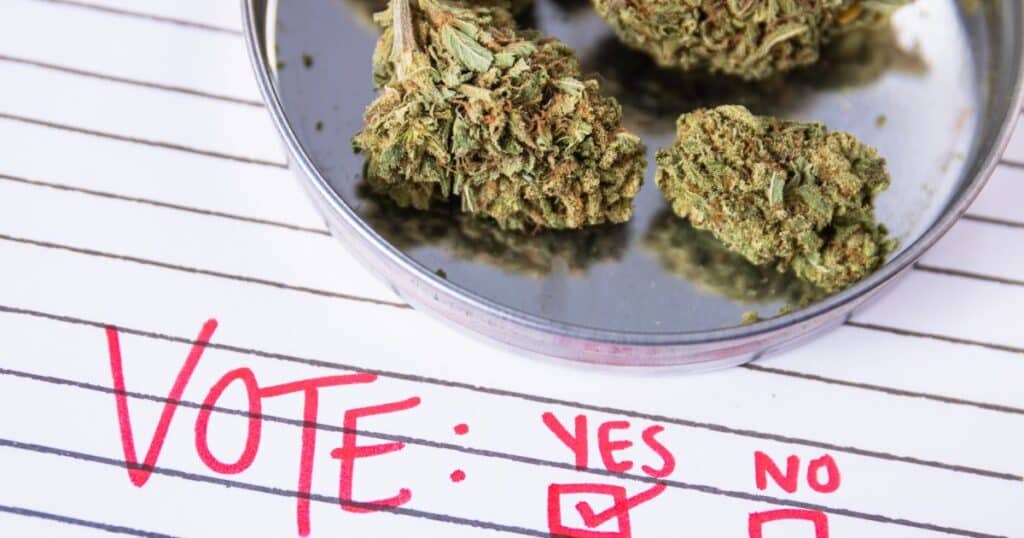Over the years, public acceptance of marijuana has surged, with more states considering changes to their cannabis laws. The 2024 election is set to be pivotal, as several states have marijuana legalization ballot initiatives that could significantly alter their legal landscape regarding marijuana.
According to a Gallup poll, about 70% of American adults now support the legalization of marijuana, marking a record high since the polling began in 1969. This flurry of marijuana legalization efforts hopefully leads to the ultimate goal of removing cannabis from the Controlled Substance Act, allowing everyone in the United States to use marijuana for medical or adult-use purposes. Let’s look at the states looking to change their current legal framework for cannabis.
Florida’s Push for Full Legalization
Florida’s Amendment 3 could revolutionize cannabis laws in the Sunshine State. If passed, it would legalize the recreational use of marijuana for adults 21 and older. Residents could legally possess up to three ounces of cannabis and five grams of concentrate. This initiative also permits existing Medical Marijuana Treatment Centers to sell to adult-use consumers. However, success hinges on securing at least 60% of the vote.
The amendment not only reflects growing support for cannabis in Florida but also aligns with broader national trends. Florida’s medical marijuana market provides a strong foundation for this transition.
South Dakota’s Third Attempt
South Dakota’s relationship with marijuana legalization has been tumultuous. In 2020, voters approved an initiative to legalize recreational cannabis, but the state Supreme Court overturned it. In 2022, another attempt failed at the ballot box. Despite these setbacks, Measure 29 presents a renewed effort to legalize recreational marijuana in 2024.
If passed, Measure 29 would allow individuals to possess up to two ounces of flower, 16 grams of hash, and 1,600 milligrams of THC in edibles. Additionally, residents could cultivate up to six plants, with a household limit of twelve. The measure reflects persistent public interest and could finally bring legal recreational cannabis to South Dakota.
North Dakota’s Road to Recreational Use
In North Dakota, Measure 5 aims to legalize recreational marijuana for adults 21 and older. This initiative allows possession of up to one ounce of cannabis, four grams of hash, and 300 milligrams of THC in edibles. Home cultivation of up to six plants per household would also be permitted.
North Dakota has attempted to pass similar measures in the past, but they were unsuccessful. This year’s initiative is crucial, as it reflects a growing trend toward legalization in the region. With neighboring states like Montana and Minnesota already legalizing recreational use, North Dakota’s potential shift could align with regional norms.
Nebraska’s Medical Marijuana Legalization Initiatives
Nebraska, traditionally conservative in its approach to cannabis, is considering two significant initiatives. Initiative 437 seeks to legalize recreational marijuana for adults 21 and older. Individuals would be allowed to possess up to three ounces of cannabis and five grams of concentrate.
Initiative 438 proposes the establishment of a medical cannabis system. This would create a regulatory framework for the legal possession, distribution, and use of medical cannabis. With nearby states already legalizing medical use, Nebraska’s potential approval would mark a significant policy shift.
Arkansas Setback For Broader Medical Marijuana Access
In Arkansas, a proposed initiative, Issue 3, aimed at expanding medical marijuana access, was initially set for the 2024 ballot. However, the state Supreme Court invalidated it, citing procedural issues. While this represents a setback, it highlights the ongoing debates over cannabis policy in the state.
Despite the setback, Arkansas has a robust medical marijuana program established in 2016. The state’s experience with medical cannabis may inform future efforts to expand access, potentially paving the way for more medical marijuana reform.
Broader Implications for Marijuana Legalization in the United States
The outcomes of these ballot initiatives could have far-reaching implications. Successful marijuana legalization in key states could accelerate national momentum for cannabis reform in the United States. Furthermore, they highlight the evolving public attitudes towards marijuana, driven by increasing awareness of its medical and economic benefits.
Next month, in December, the ongoing push for the reclassification of cannabis under the Controlled Substances Act (CSA) is expected to reach a critical juncture. This highly anticipated moment stands to potentially redefine cannabis’ legal status on a federal level. With significant implications for policy, business, and personal rights, the decision will provide insight into the federal government’s stance on marijuana reform.
Close attention is being paid to the rescheduling or descheduling debate, which may shape future legislative efforts and influence state-level initiatives. As various stakeholders prepare for this pivotal development, the outcome may signal the trajectory of cannabis policy in the United States for years to come.
The implications of a reclassification could lighten restrictions, facilitate research, and offer more accessible pathways for medical and recreational use, marking a transformational shift in how cannabis is regulated nationally.
For those interested in cannabis policy and its implications, staying informed is essential. Whether you’re a resident in one of these states or simply an observer, these ballot initiatives highlight the shifting landscape of marijuana legislation. As public attitudes continue to evolve, the outcomes of these measures will likely shape the future of cannabis policy in the United States.

















